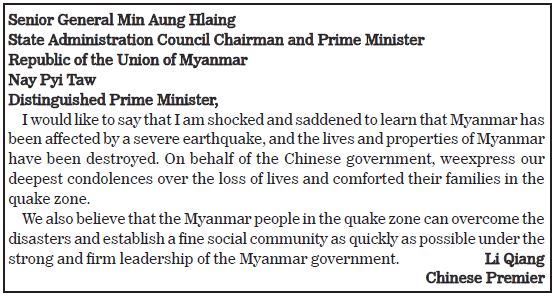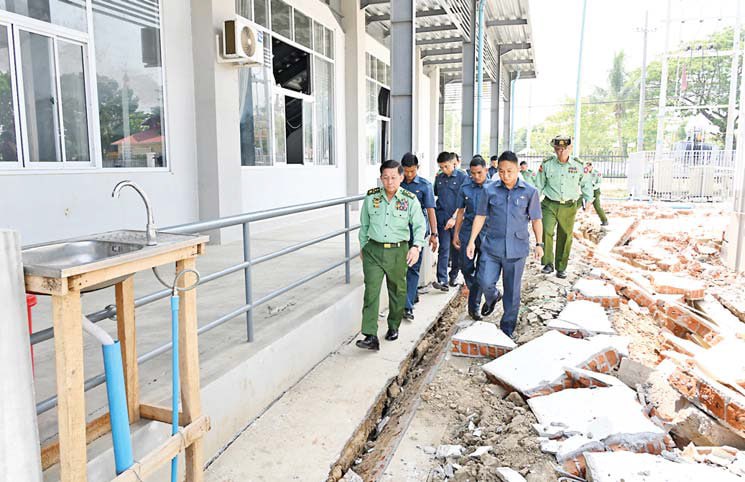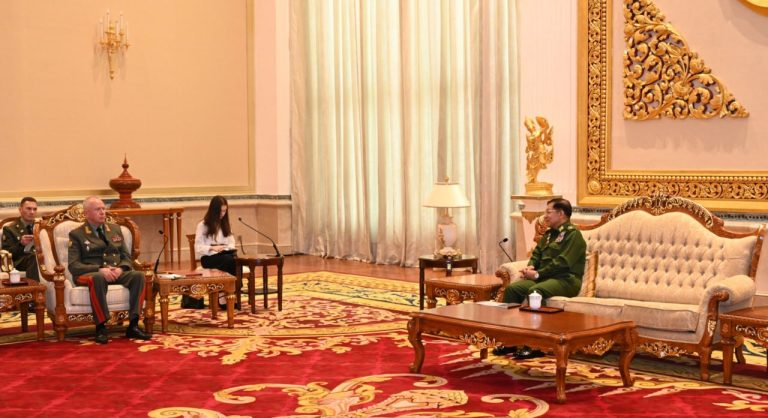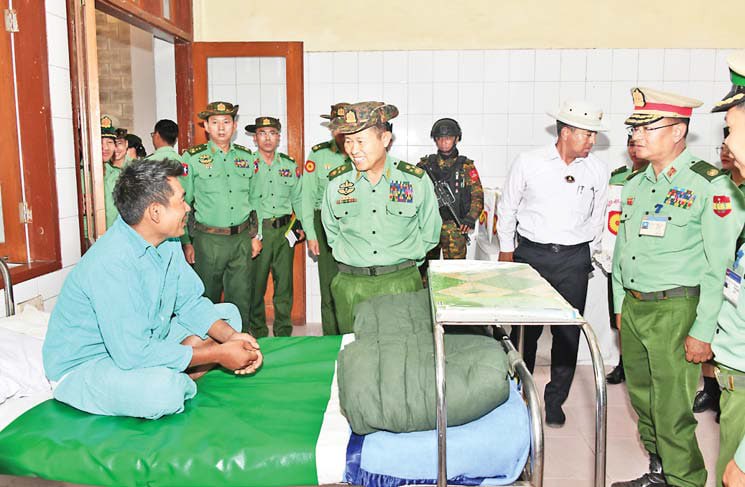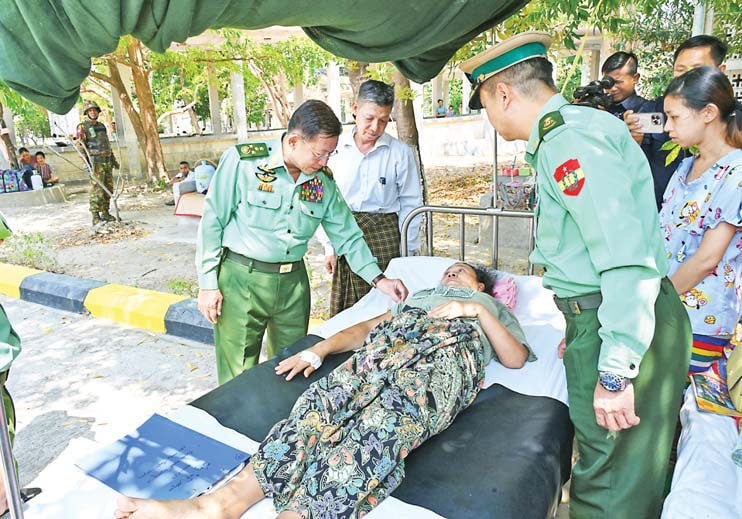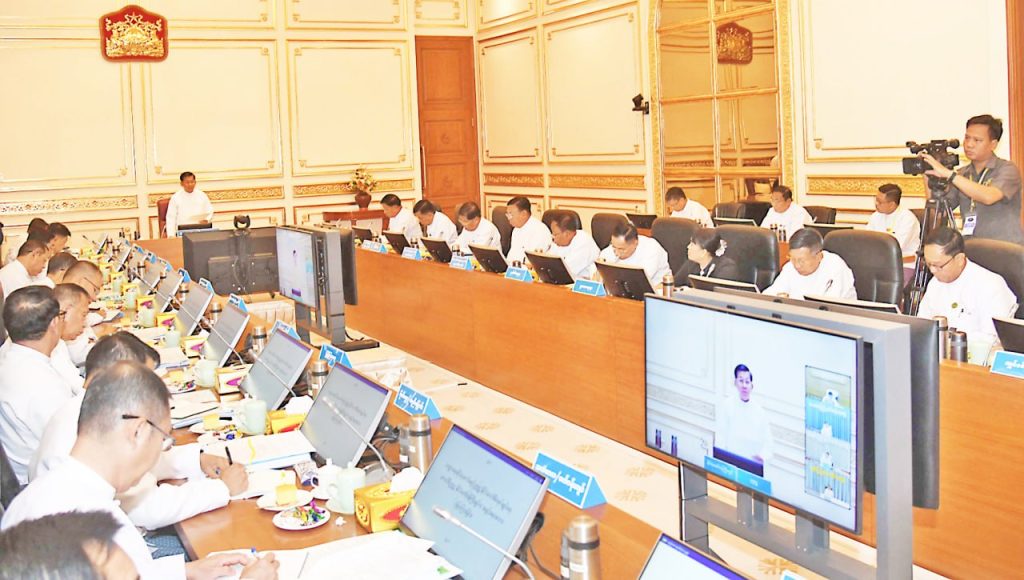
24 March 2025
Chairman of the State Administration Council Prime Minister Senior General Min Aung Hlaing who is also in the capacity of Chairman of the Financial Commission delivered a speech at the meeting of the Financial Commission at the SAC Chairman Office in Nay Pyi Taw this afternoon.
Also present at the meeting were Vice Chairman of the Commission SAC Vice Chairman Deputy Prime Minister Vice-Senior General Soe Win, Secretary of the Commission Union Minister for Planning and Finance U Win Shein, Union ministers, the Auditor-General of the Union, the Chairman of Nay Pyi Taw Council and deputy ministers together with chief ministers of regions and states through a video conferencing.
At the meeting, the Senior General said that the meeting aims to discuss and approve the budget of the Union and the Union Budget Bill drafted for 2025-2026 financial year. Ministries, Nay Pyi Taw Council, regions and states have to spend the prioritized expenditure for relevant sectors and regions in order to implement three economic objectives of the State.
Departments and organizations prioritize spending of the State fund on infrastructural roads and bridges, supply of electricity, transport, export promotion, import substitute, and job creation which can directly contribute to development of the country.
The State yearly allows expenditures to be spent under the State policy, emergency measures for the people, State economic promotion, creation of employment opportunities, development of socioeconomic life, agriculture and livestock farms, and improvement of MSME businesses.
With regard to implementation against the targets in relevant financial years, the State managed 71.78 percent of incomes and 77.06 percent of spending in 2020-2021 FY, 96.10 percent of incomes and 84.25 percent of spending in the six-month period from October 2021 to March 2022, 104.96 percent of incomes and 90.78 percent of spending in 2022-2023 FY, 97.03 percent of incomes and 89.32 percent of spending in 2023-2024 FY, and 71.11 percent of incomes and 59.55 percent of spending till January of 2024-2025 FY.
Departments and organizations have to strive for exceeding the income target in the financial year. The allocated funds must be scrutinized and spent efficiently for the State during the set period. Only when they implement the projects directly benefiting the people during the set period will the State have socioeconomic development.
It is necessary to manage deficiency and GDP ratio in the appropriate amount to ensure stability of macroeconomy of the State long-term economic development. A plan has been set to achieve Ks-171,498 billion of GDP with three per cent of economic development rate in 2025-2026 FY.
Departments and organizations need to follow the public financial management under the existing laws. Hence, members of the Financial Commission have to discuss the Budget of the Union and the Union Budget Law for 2025-2026 FY to be submitted by the Union government to the State Administration Council in time.
Later, the Vice Chairman of the Financial Commission Deputy Prime Minister stated that in order to effectively manage budget deficits, revenue estimates for the Union-level departments and organizations should be based on realistically achievable amounts and closely calculated projections. On the expenditure side, funds should be allocated to national development projects efficiently, without wastage, and in a way that supports economic growth. Accordingly, the Union-level departments and organizations’ estimated expenditure budgets for the 2025-2026 fiscal year have been further reviewed. Similarly, the estimated expenditure budgets of the regions and states for the 2025-2026 fiscal year have also been examined in coordination with the relevant departments and organizations.
Regarding revenue projections, efforts have been made to ensure full collection of due revenues, implement tax rates appropriate for the current period, fully recover arrears from previous years, and secure feasible foreign loans and aid.
For unforeseen natural disasters, an emergency fund has been allocated Ks-200 billion at the Union level, and Ks-1 billion each for the Nay Pyi Taw Council, regions, and states, totaling Ks-15 billion, with an overall allocation of Ks-215 billion for disaster prevention, relief, rehabilitation, and the welfare and administrative needs of displaced persons.
The Financial Commission has reviewed the Union’s estimated expenditure budget for the 2025-2026 fiscal year, including grants to regions and states, as well as the draft Union Budget Law based on it, and has endorsed its approval.
Following this, Secretary of the Financial Commission Union Minister U Win Shein explained the Union’s estimated revenue and expenditure budget for the 2025-2026 fiscal year and the draft Union Budget Law.
Subsequently, Union Minister for Legal Affairs Union Attorney-General Dr. Thida Oo provided legal recommendations on the draft laws, while Union Auditor-General Dr. Khin Naing Oo presented audit findings and recommendations regarding the estimated expenditure budgets.
The Chairman of the Nay Pyi Taw Council and the Chief Ministers of the regions and states then each gave their respective presentations.
In response to the presentations, the Chairman of the Financial Commission Chairman of the State Administration Council Prime Minister emphasized that budget allocations have been increased for domestic affairs, defence, health, and education sectors to support national development. He noted that improved monetary circulation would boost the economy and urged ministries and regional/state governments to base budget projections on realistic and utilizable amounts.
He further stressed that funds should be used for the benefit of the nation and its people, ensuring revenue targets are met and expenditures are directed toward truly impactful areas.
He highlighted that budget allocations for strengthening the defence forces’ capabilities are necessary for national stability, a practice common in other countries as well.Electricity generation projects take time to build and cannot be completed quickly.
To address this, we are actively developing and implementing projects to meet the country’s electricity demands. Efforts are also underway to resume halted projects. We aim to promote solar power generation at the regional and state levels and encourage private ethnic entrepreneurs to contribute as much as possible. Collaborative efforts in this direction will significantly support the nation’s electricity needs. We need to use the budget systematically and monitor the implementation of projects systematically.
We want ministries to monitor and inspect any work that is carried out in accordance with the rules and regulations.
We need to work systematically and with dedication to the country and the people to make the projects successful.
Then, the Chairman of the Finance Commission, Chairman of the State Administration Council, the Prime Minister, delivered the concluding speech, announcing that the Union Budget and Union Budget Bill for the 2025-2026 FY were scrutinized and approved at today’s meeting.
The 2025-2026 FY budget has approved the provision of educational support to students studying knowledge and skills in the education sector for the comprehensive development of the state, and the provision of awards based on the degrees obtained for teachers.
The budget includes the necessary expenses for expanding and opening agricultural and livestock universities to improve the agricultural and livestock sector, the expenses for building recreation centers for students at each university, the expenses for solar water pumping system projects and businesses that will result in quick-impact projects, and the expenses for socio-economic promotion.
It was also found that the expenditure includes the construction of roads and bridges to improve transportation and infrastructure development, and the expenditure for electricity generation to provide electricity.
The Union Ministries and Region or State Governments should ensure that the allocated expenditure is beneficial to the needs of the state and the people, and that the allocated expenditure is actually implemented and fully and on time, and that the accounts are audited.
It is also important for the Union Ministries and Region and State Governments to manage and supervise the full amount of revenue as allocated, and therefore, they should make special efforts to collect tax revenues in accordance with the existing tax laws, and the meeting was adjourned.

